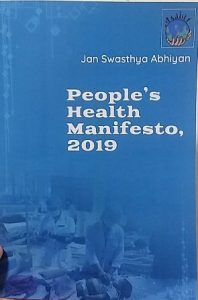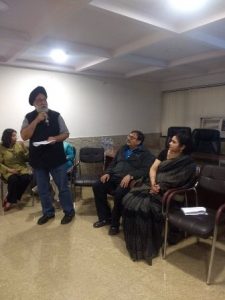Activists urge scrapping of PM-JAY; demand Right to Health in election manifestos
The Jan Swasthya Abhiyan’s People’s Health Manifesto lists out 29 demands including increase in public health expenditure through general taxation to 3.5 per cent of GDP in the short term and five per cent in the long term accompanied by adequate supply of free medicines and diagnostics.

“Why should budgets cut on health spending?” asked an assertive N.B.Sarojini, coordinator of Sama-Resource Group for Women and Health and one of the National Convenors of Jan Swasthya Abhiyan (JSA) which is the Indian Chapter of People’s Health Movement.
Recall that the February 1 Interim Budget’s allocation for Department of Health and Family Welfare was announced at Rs. 61,398.12 crore for 2019-20 with 13 per cent increase compared to the current financial year which reportedly hasn’t kept pace with the demand for health infrastructure, human resources and rising disease burden even as the ambitious Ayushman Bharat finds significant allocation.
Sarojini, while releasing the People’s Health Manifesto drafted by JSA in the run up to the 2019 General Elections, which urges for expansion and strengthening of health services, told Delhi Post that “larger picture of the budget needs to be taken into account”. “The empirical studies will take some more time to actually document the reach of Pradhan Mantri Jan Arogya Yojana (PM-JAY) scheme, but previously, studies on the effectiveness of RSBY (Rashtriya Swasthya Bima Yojana) and other state government health schemes have shown that they haven’t been able to have the necessary reach and adequate care when it comes to ‘Health for All’ motive. Rather than reducing, they increase “out-of-pocket expenditure”, and that they are associated with inappropriate and unnecessary care. Why not divert resources into that?” she quipped.
Calling out that there is “massive information asymmetry” which is to say that patients simply don’t know and have no option but to follow what the doctor says at face value, development economist Prof. Jayati Ghosh iterated that it is “much better to do public provision and regulation, and monitor through appropriate funding”.
“This problem of information asymmetry generates what economists call as market failure or when the market doesn’t give you the desirable outcome. Most countries have not succeeded in resolving this issue even when they have better regulations as compared to India. Therefore, it is very important to have public funding and public provision than to think about the various kinds of deliveries,” she said.
“It is an absolutely crucial time to demand health spending. At the moment, we have the lowest per capita health spending in the world. Our proportion of public spending is worse than the countries of Sub-Saharan Africa. So, political will needs to be raised,” she told Delhi Post.
Also read:Lack of rural healthcare: Story of Bihar’s Phag
JSA comprising of a network of 18 national organisations working in the health care field have formally released the manifesto in New Delhi and are in talks with political parties to bring at least some of the 29 demands on election manifestos. One of the prominent ones is “abandonment of the PM-JAY” or National Health Protection Scheme as part of the flagship Ayushman Bharat.
They state that it is based on the discredited “insurance model” and the “projected outlay of Rs. 12,000-50,000 crores as per different estimates, would be much better utilised by investment in expansion of public facilities and infrastructure”.
“There is a design problem because you can’t have a scheme that is targeted towards only a section of the population. It is a populist kind of a scheme. We have seen the experience of various state governments which run such schemes which have been raised from Rs.50,000 to two and a half lakh cover. It will not really penetrate deep into the people,” independent researcher and health activist Ravi Duggal told Delhi Post.

Accusing the government of appeasing the private sector lobby, JSA went on to question the January 2019 press statement ‘Broad Guidelines for Private Investments in setting up of Hospitals in Tier 2 and Tier 3 cities subsequent to PM-JAY’ which incentivises the private sector through land, funding and facilitating clearances for setting up of hospitals.
“It is absurd that while the Government is unable to regulate the private hospitals that currently exist, now it will be actively investing in more such ones! Announcing it just months before the polls also shows the appeasement of the strong private health sector lobby,” they stated.
Demanding that the scheme should be cancelled, they said that the direction for the government should be to “selectively use private health care resources, contrary to the current approach of unjustifiably and unfairly promoting the interests of sections of private health care industry”.
The People’s Health Manifesto lists out demands including increase in public health expenditure through general taxation to 3.5 per cent of GDP in the short term and five per cent in the long term accompanied by adequate supply of free medicines and diagnostics.
“Among other demands, upgrading of primary health centres and community health centres to ensure Universal Health Care rather than “Universal Health Coverage” has been pointed out.”
Also read: Zero Thalassemia by 2022: Activists seek 10-Point agenda in 2019 Election Manifestos
“Government says that primary health services should be strengthened yet there is no political will. There is no work on strengthening the primary health centres which is not a good sign. There is no last mile connectivity to hospitals or health centres. And there have been instances where people have not been able to make the cards (because Aadhaar-linked data is incorrect or the fingerprints in older people don’t match) or are even being charged for making the cards. Such malpractices are happening,” Sunita Singh from the Health Watch Forum who also works with NGO Sahayog in Uttar Pradesh told Delhi Post.
“In my field visits as part of Sahayog, I have been interacting with patients who have undergone treatment but have been asked to pay extra charges because the treatment has been largely free of cost. But such payments are not on record,” expressed Singh while pointing that Health should be a fundamental right.
The manifesto also demands for regularisation of all “contractual health workers including ASHAs, Anganwadi workers and helpers so that they would receive protection from the entire range of labour laws”.
“The seven-page manifesto is the culmination of the demands raised and reflected at the National Health Assembly held in Raipur where 1,400 people across 24 states debated various health issues.”
It reads, ‘In the 40th year of adoption of the Alma Ata Declaration (September 1978) of ‘Health for All’, as a nation we must revive the concepts of inter-sectoral action and community empowerment as being central to health’.
“Let’s see how many political parties will be interested to take our major demands. How many will consider to take it alongside their manifestos and what happens when they come to power,” opined Sarojini.
Also read: Oxytocin: Critical Drug, Crucial Debate
On the need of manifestos in the public domain on different aspects of health, Duggal feels that “undermining public health system is catastrophic”.
“There are many manifestos in the public domain because we feel that our republic or our democratic rights are being threatened. Political alternatives are being considered. I think a lot of political parties today are concerned as 2.5 per cent of GDP growth is an issue. All parties have realised that we are investing too less in health. Health will be a significant issue during the polls for all and is definitely getting momentum,” summed up Duggal.
